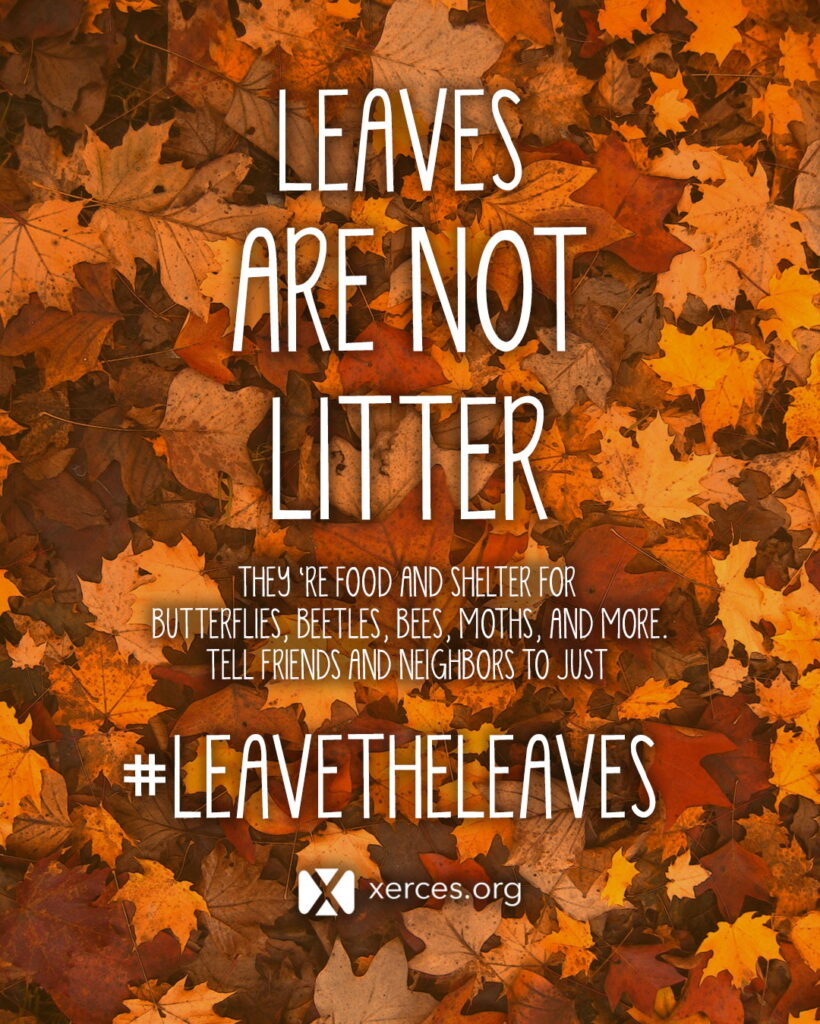WHAT IS “LEAVE THE LEAVES”?
Leave the leaves is a message about what you can do in your own yard to help out our endangered pollinators and other beneficial insects over the winter.
It’s so easy! You can help the good guys MORE this year by doing LESS work!
Just leave the leaves right where they fall – especially in shrub and flower beds.
A lot of beautiful and important living things spend their winter there in and under the leaves. By letting them be, you can save the bees.
Who else spends the winter there? Here are some other beneficial critters that your inaction will benefit:
- Wooly Bear caterpillars
- Cocoons, chrysalises, and eggs of butterflies and moths (For example, swallowtail and red-banded hairstreak butterflies, and the majestic luna moths)
- Harmless and helpful native bees – the sweat bees, mustached mud bee, leaf cutter bee
- Stick insects
- And many more!
If you’re thinking, “Wait; I don’t want more bugs in my yard!” – think about this. Only 2% of the world’s insects are pests to us, (for example, mosquitoes, fleas, and Japanese beetles) The rest of those insects you might see in your yard – 98 insects out of every 100 – do not hurt us or bother us at all!
“Bugs” have a bad reputation, but they don’t deserve it.
If you’re thinking, “If I leave leaves on my lawn, it will kill it!” Yes, leaves left on lawn over the winter can block the sun and create disease-promoting conditions. Keep reading to find out what to do with leaves on the lawn!
WHY LEAVE THE LEAVES?
Our lives depend on our natural world, including insects. Each of these critters has a job in our ecosystem that keeps our natural world working – from pollinating our vegetable plants to decomposing those fallen leaves.
Think of your favorite winning sports team. Every member in that system plays an important part, from the coach, to every player, to the guy giving out Gatorade. Even if you don’t know the names of the players (or sports at all), you know that each member plays a role in the success of the organization.
WHAT YOU CAN DO
You can do something positive to help pollinators.
If this is your first time Leaving the Leaves, just choose one garden bed and don’t rake the leaves out or blow them this fall. Done! You have just helped pollinators this winter!
If you’re ready to do more…
- Rake more leaves off the lawn and into garden beds – up to 3-5 inches deep.
- Leave dried stems over the winter – don’t cut them back. Many beneficial insects lay their eggs in stems to spend the winter.
- Let wildflowers go to seed for the birds. Don’t cut them back.
- Let vegetable garden plants like broccoli or lettuce bolt. That means, let them make flowers. This provides nectar for pollinators long into cold weather.
- If you can, create an out-of-the-way wild place for pollinator habitat. Drag tarps full of more leaves to this spot.
- Pile branches in your wild place, and you’ll be providing even more shelter for overwintering bumble bees or butterflies.
- Remember not to “clean up” too soon in the spring, or you will harm the lives you just saved. Wait until temperatures have risen to 50 degrees Fahrenheit for at least a week before you do your spring clean up.
HOW IT BENEFITS YOU
- Leaves are free fertilizer and mulch for your garden plants.
- You save yourself some work this fall, and give yourself time to do other things.
- More beneficial insects in your yard help control pests next spring.
- You have the benefit of knowing you’ve taken a really important step to help endangered pollinators and other beneficial insects.

Categories
-
 BlogRead the latest blog posts from your FOTR team.
BlogRead the latest blog posts from your FOTR team. -
News & EventsLearn more about upcoming FOTR events and projects
